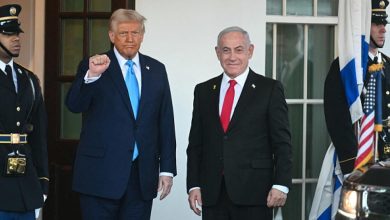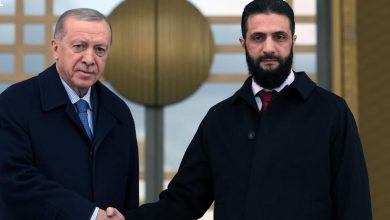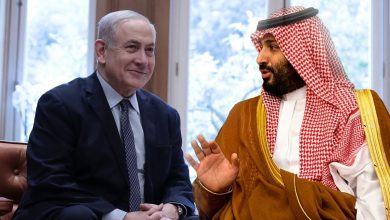Moktar Ould Daddah: The Mauritanian Leader Who Championed Palestine in Africa
Mauritania’s first president, Moktar Ould Daddah, championed Palestine and fought Israeli influence in Africa.

Watan-Mauritania’s position on the Palestinian cause has been a central pillar of its foreign policy, especially during the presidency of Moktar Ould Daddah, the country’s first president, who led Mauritania from its independence in 1960 until his overthrow in a military coup in 1978.
Daddah’s policies played a crucial role in shaping the country’s international relations, emphasizing his unwavering support for the Palestinian people and their struggle for liberation.
Before delving into Daddah’s significant efforts to counter Israeli influence in Africa, it is essential to review his broader stance on the Palestinian cause, how it guided Mauritania’s foreign policy, and how he contributed to promoting the issue on the global stage. Additionally, we will explore examples of the support Mauritania provided to Palestinians during his rule.
The Presence of the Palestinian Cause in Mauritania
Dr. Mohamed Mokhtar Sidi Mohamed Al-Hadi, a professor of contemporary history at the University of Nouakchott, told Al Jazeera Net that the Palestinian cause had already resonated among the Mauritanian elite even before the country gained independence in 1960. For instance, in 1948, Ahmed Ould Baba, Mauritania’s representative in the French parliament, opposed the UN partition plan for Palestine and voted against it.
However, the most impactful and vocal stance in support of the Palestinian cause came from founding President Moktar Ould Daddah. At a time when Mauritania was a newly independent state navigating regional alignments and international recognition, its position on Palestine added moral and political weight to its stance on decolonization and independence.
This significance was not lost on Israeli Prime Minister Golda Meir, who, through various intermediaries, attempted to establish contact with Ould Daddah. However, he firmly rejected any engagement.
Former Mauritanian Minister of Information Mohamed Mahmoud Ould Wadadi noted that during the 1950s, as political awareness grew in Mauritania, people became increasingly informed about the Palestinian struggle and displacement. Immediately after independence, President Ould Daddah declared Mauritania’s unwavering support for the Palestinian people, condemned the partition of Palestine, and refused to recognize Israel.
According to Ould Wadadi, the Palestinian cause became the only foreign issue that united all Mauritanians, with no other external concerns taking precedence except for protecting Mauritania’s own sovereignty.
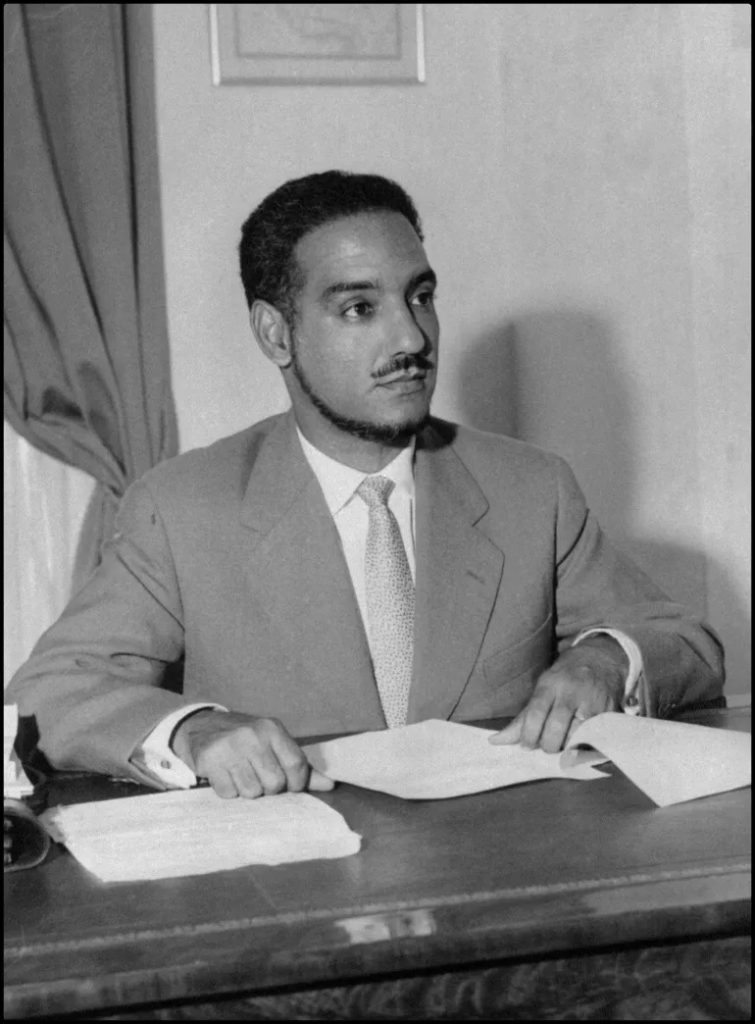
In his memoir Mauritania on the Path of Challenges (published in 2006), Ould Daddah recalled:”During the 1967 war, we severed ties with the United States and expelled all Americans from our country, including members of the Peace Corps, which had been providing technical assistance. This was in protest against U.S. support for Israeli aggression against our Arab brothers. At that time, we were not yet a member of the Arab League.”
He added:”Our diplomatic break with the U.S. lasted for two and a half years and only ended in December 1969 following mediation from friendly nations and consultations with Algeria and Egypt. Afterward, U.S. President Richard Nixon warmly received me in 1971 when I was the chairman of the Organization of African Unity.”
During the 1973 war, President Nixon sent Ould Daddah a letter asking for his support in efforts to resolve the Middle East conflict. The letter read:”I still remember our meeting in September 1971 and our frank exchange of views. I trust that you will support my efforts to find a lasting resolution that upholds the rights of all Middle Eastern peoples.”
Ould Daddah also revealed that Egyptian President Anwar Sadat was in continuous contact with him regarding the Middle East issue, as was his predecessor, Gamal Abdel Nasser. Both leaders consistently praised Ould Daddah for his role in advocating for Palestine at the African level.
In a secret discussion in May 1973—months before the October War—Sadat privately informed Ould Daddah of his plans to launch an attack on Israel, later reaffirming this during a Non-Aligned Movement summit in Algeria in September 1973.
“Of course, I never disclosed this secret until now,” Ould Daddah wrote.
After the war, Sadat sent General Hosni Mubarak to propose sending Egyptian troops to help Mauritania fight the Polisario Front. However, Ould Daddah declined the offer, arguing that Egypt needed to focus all its military resources on its conflict with Israel.
Giving Palestine a Voice on the Global Stage
According to African affairs expert Ismail Sheikh Sidiya, Ould Daddah’s ability to advocate for Palestine stemmed from his skills as a lawyer and his strong ties with African leaders.
He successfully engaged with both Western and Eastern capitals and, as the chairman of the Organization of African Unity, convened the first-ever UN Security Council meeting at the OAU headquarters in Addis Ababa.
As a leading figure in the Non-Aligned Movement, Ould Daddah recalled in his memoirs:
“Thanks to Mauritania, Palestinian resistance had its first opportunity to speak at a Non-Aligned Summit in Lusaka in 1970, where I was elected vice president. Presiding over the closing session allowed me to grant the floor to a Palestinian representative despite strong opposition from several member states.”
Former Minister Ould Wadadi recalled that in 1969, Mauritania received its first official representative from the Palestine Liberation Organization (PLO), Said Al-Abbasi (Abu Fahd), who opened an office in Nouakchott. The government provided him with an office, housing, a vehicle, and an annual stipend. This office later became the Embassy of the State of Palestine in Mauritania.
Additionally, Mauritania’s national radio station broadcast Palestinian revolutionary messages in Arabic and French, reaching vast parts of Africa. This office became the launchpad for Palestinian activism in sub-Saharan Africa, influencing other nations to establish Palestinian representation.

Fighting Israeli Influence in Africa
Ould Daddah played a crucial role in curbing Israeli influence in Africa, stating in his memoirs:
“In 1973, Mauritania played a role in the movement that led the majority of African countries to sever ties with Israel.”
He continued:
“For 20 years, I tirelessly explained the Palestinian cause to my African peers, particularly in French-speaking nations. It was no easy task given Israel’s powerful propaganda machine. However, over time, they came to understand the Palestinian struggle and recognized the blatant injustice endured by a people suffering under merciless occupation.”
According to Dr. Mohamed Mokhtar, Ould Daddah’s efforts led 20 African nations to cut diplomatic ties with Israel, including Guinea, Chad, Mali, Niger, Congo-Brazzaville, Burundi, Zaire, Togo, Nigeria, Cameroon, Ivory Coast, Senegal, Angola, Mozambique, Ethiopia, Benin, Kenya, Rwanda, Botswana, and Cape Verde.
By that time, Israel had diplomatic representation in only five African nations:
- Apartheid South Africa
- Lesotho
- Malawi
- Swaziland
- Mauritius
Championing Palestine at the African Level
Minister Ould Wadadi emphasized that the 1963 founding of the Organization of African Unity (OAU)—in which Ould Daddah played a key role—helped rally African support for Palestine. African summits and conferences became platforms where the Palestinian issue was openly discussed.
In a notable 1970 diplomatic incident, Ould Daddah boycotted a White House banquet hosted by President Nixon because Nixon refused to meet with Kenneth Kaunda, the then-chairman of the OAU and President of Zambia. Ould Daddah wrote:”Some told me that sitting next to the U.S. President could be financially beneficial, but for me, honor and dignity are priceless.”
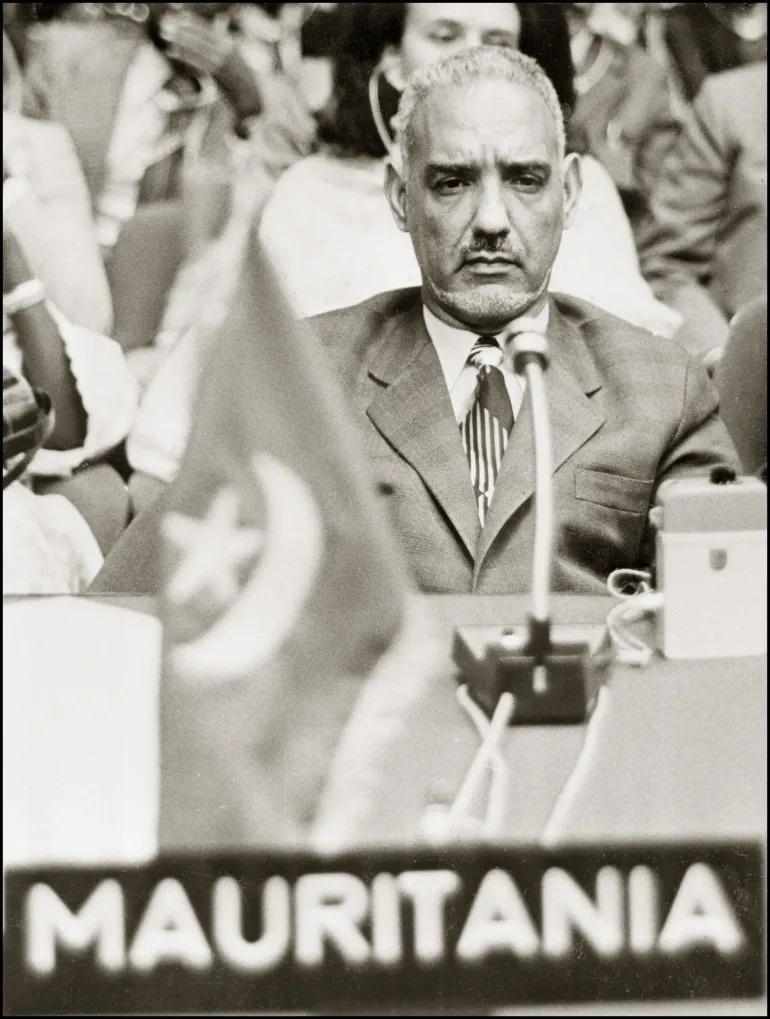
Conclusion
Mauritania’s first president, Moktar Ould Daddah, was a pioneering advocate for the Palestinian cause in Africa, using his diplomatic influence to curb Israeli expansion and strengthen African solidarity with Palestine. His legacy continues to shape Mauritania’s steadfast stance on the issue today.



